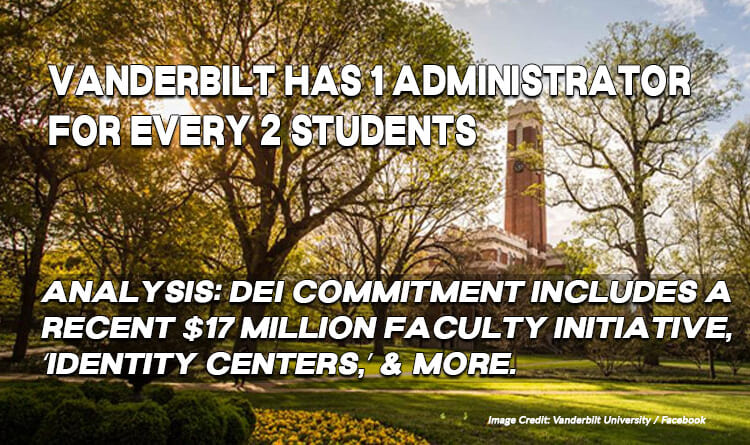ANALYSIS: DEI commitment includes a recent $17 million faculty initiative, ‘identity centers,’ and more.
Image Credit: Vanderbilt University / Facebook
By Maggie Kelly [Assistant Editor, The College Fix] –
Vanderbilt University employs more than one full-time administrator for every two students, a College Fix analysis found.
During the 2021-22 academic year, the most recent for which data are available, the private Nashville university employed 3,516 full-time administrators and support staff, according to information the school filed with the federal Integrated Postsecondary Education Data System.
Administrators and support staff include management, student and academic affairs divisions, IT, public relations, administrative support, maintenance, legal, and other non-academic departments.
In 2022, Vanderbilt’s reported full-time undergraduate student enrollment was 6,983. That amounts to 517 full-time administrators and support staff per 1,000 undergrads, or more than one for every two students.
Vanderbilt employed 1,149 teaching and instructional staff in 2021-22, meaning it offered 164 educators for every 1000 students.
Professor Glenn Reynolds, who teaches law at the University of Tennessee, weighed in on the numbers in an email to The Fix.
“No school should have that many administrators,” he wrote. “Since universities are nonprofits, they don’t pay dividends to shareholders. Instead, they tend to plow ‘profits’ into staff and buildings.”
“The bloated staff has been a major cause of skyrocketing tuition and student debt,” he said.
The Fix emailed Vanderbilt media relations twice over the past week and left a voicemail with its strategic communications department on Jan. 5, asking why the ratio of administrators to students was so high and what value administrators offer to students and faculty. No response has been received.
Justin Owen, the president and chief executive officer of the Beacon Center of Tennessee, a non-profit free market think tank, told The Fix in an email that “there is an ongoing trend to spend more on administrators and less on teaching students.”
“Colleges shouldn’t be wasting money on highly paid administrators whose jobs have little to nothing to do with whether a student will get a good education and a good job upon graduating,” Owen said.
The Fix determined last month that Northwestern University also employs more than one administrator for every two undergraduates, including several new DEI staff in its sports program.
Even more, an analysis conducted by The Fix in December on Youngstown State University in Ohio found that the ratio of administrators to students grew more than 13 percent over the past four years, even as full-time undergraduate enrollment fell almost 16 percent.
In its hiring, funding and self-promotion, Vanderbilt shows a strong commitment to DEI principles.
“Our commitment to equity, diversity, and inclusion (EDI) is woven into the very fabric of our work, our community, and our mission,” its website states.
In July, The Fix reported that Vanderbilt had launched a $17 million faculty DEI initiative to advance diversity.
The initiative, funded in part by the National Institutes of Health, aims to “accelerate diversity, equity, inclusion and belonging in the biomedical research community,” according to an announcement from the VUMC Reporter, the in-house publication of the medical school’s media team.
Vanderbilt’s “Equity, Diversity and Inclusion” staff website lists four “identity centers,” such as the Bishop Joseph Johnson Black Cultural Center and the Office of Lesbian, Gay, Bisexual, Transgender, Queer, and Intersex Life, and 23 staff positions.
Over the 2021-22 academic year, EDI leaders developed a “comprehensive strategic plan” with six impact areas, according to its 2021-22 “Report for Equity, Diversity and Inclusion.”
Under the header “Belonging,” Vanderbilt listed the cultivation of “identity initiatives,” which it defines as “research hubs and support networks for institutionally under-resourced and marginalized communities” at the university.
Vanderbilt lists eight such “initiatives,” including AAPA for those identifying as Asian American and Pacific Islander, PersistVU for low-income students, and SomosVU for “Latinx/Hispanic people.”
Vanderbilt sponsors “Graduate Recognition Ceremonies” separated by identity group, according to its website.
*Note: Article Republished on The Tennessee Conservative by express permission from The College Fix.












